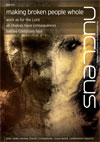Tim Keller, Hodder and Stoughton 2010
£9.00 if purchased via CMF website
Often there is tension between sharing God's word and caring for the poor. Though meaning to do both, it is easy for local churches to polarise toward one or the other. For some, evangelism and preaching are rightly central – but ministering to the poor of the congregation or local community goes by the wayside, seen as not 'evangelistic' enough. Others demonstrate a deep concern for the poor locally and globally, sacrificially acting and giving. This commitment takes time and effort, so evangelism and preaching can suffer.
Should there really be any such tension? Faith without any concern for the poor raises questions – has someone really understood what Jesus has done for them? Yet social action on its own will not ultimately transform those being helped. Only belief and trust in Jesus can do that.
Starting by defining justice as a 'wide range of activities that reflect the character of God', justice is considered in the light of the Old Testament, and then of Jesus' teaching. The Good Samaritan parable is discussed in depth. Further chapters consider why we should 'do justice' with applications made to church communities, local neighbourhoods, and more widely. The chapter on 'Doing Justice in the Public Square' considers challenges when working with non-Christians who share our concerns over poverty or homelessness. Keller strongly refutes the common idea that Christians should keep their faith out of such work, saying that really no-one is morally neutral about helping the poor. He warns 'Christians should not be strident and condemning in their language or attitude, but neither should they be silent about the biblical roots of the passion for justice.'
A few examples may seem out of context for non-US readers; the bigger role of the state in the UK means that government here does things that are done by churches in the US in some examples given. The more polarised relationship between Christianity and politics in the US also flavours some passages, as any 'evangelism – social action split' has often mirrored a 'right – left' split. Keller is clear that no political philosophy has a monopoly on justice – perhaps more powerful coming from an American, given the apparent polarisation of Christian positions on politics in the US.
Although tackling a complex and weighty subject, Keller's style and storytelling ability make the book easy to read. Repeated references to the example and person of Jesus mean that I finished reading the book with a greater desire to trust and follow him – ultimately the only way that I or any believer will really 'do justice'.
































